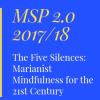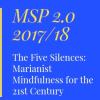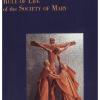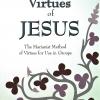NACMS has classified our publications by level to aid you in finding material most helpful to you:
- Basic for those new to the Marianist world and having little or no prior knowledge of Marianist history or the Marianist charism
- Intermediate for those who have some knowledge and understanding of things Marianist
- Advanced for those who have significant knowledge and understanding of things Marianist and want to go deeper
- Resource materials, including prayers, activities, and reflections for individuals and groups
- Reference materials, including source documents and compendia
The resources listed below are found within our e-publications and bookstore. Items available in our library are not listed, but can be found by searching in our library catalog.
Holy Silence and Contemplative ListeningMarg Van Herk-Paradis, as part of MSP 2.0, has crafted a model to examine Blessed Chaminade’s Five Silences. Of interest to Van Herk-Paradis is the circular nature of the Silences and the interplay between “stance” and "spirit.” Special emphasis is placed on those who minister to the People of God. |
||
Love Your Enemy: A Reflection on the Silence of PassionMary Snyder, as part of MSP 2.0, examines life lessons that shape her thinking related to social justice and the need for "nonviolent communication" in today's society. Key to her examination is the practice of Blessed Chaminade's concept of "silence of passion" and the need for dialogue in today's society. |
||
Our Marianist HeritageJoseph Stefanelli, SM, discusses Father Chaminade’s spirituality, its scriptural and historical underpinnings, Mary and some of her titles, and the concept of community within the institute and within the Church as a whole. |
$10.00 | |
Lonergan's Transcendental Method and the Marianist MethodThe focus of Sister Marcy Loehrlein's paper is to establish the relationship of the method of the Marianist virtues to the cognitive and volitional method developed by Bernard Lonergan, SJ. |
||
Commentary on the Rule of Life of the Society of MaryThis book includes 52 articles that reflect the major themes in the life of Marianist religious. |
$24.00 | |
Conference on Father Chaminade's System of VirtuesA conference on Father Chaminade’s System of Virtues, given by Fr. William Ferree, SM. |
||
Virtues for MissionFather Lackner’s title, Virtues for Mission, sets the reader on the path of seeking spiritual development for a reason: to prepare oneself to be an active participant in the Christian mission, to be purposeful, to have a goal. |
$10.00 | |
Manual of Marianist SpiritualityWhen people call the NACMS office to ask for a good introduction to the essential elements of Marianist Spirituality, this is the book we recommend. |
$10.00 | |
Habits for the Journey: A Mystical and Political Spirituality for Small Christian Communities"Habits for the Journey" presents a spirituality for Small Christian Communities. |
$14.00 | |
Growing in the Virtues of JesusFather Hakenewerth guides us on a journey of inner-peace and a union with Jesus, enabling us to face life in a Christ-oriented manner. |
$13.00 |










